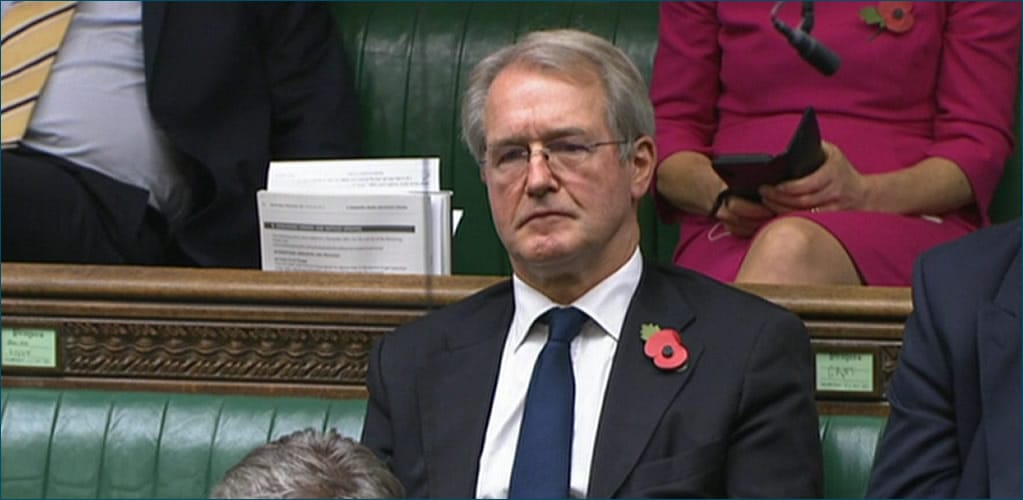Owen Paterson’s role in Brexit.
Paterson’s career as an MP has ended in disgrace, although he may well continue to play his part in the ‘Brexitosphere’ of thinktanks and pressure groups in which he has had so prominent a role before and after Brexit.

Paterson’s career as an MP has ended in disgrace, although he may well continue to play his part in the ‘Brexitosphere’ of thinktanks and pressure groups in which he has had so prominent a role before and after Brexit.
First published in November 2021.
It’s probably fair to say that Owen Paterson was not a household name until the events that led to his resignation last week. However, he played a significant role in the Brexit saga, albeit of a particular sort. During the 2016 Referendum, he had neither the high campaigning profile of, say, Boris Johnson or Michael Gove nor quite the media profile of Brexiter backbenchers like John Redwood or Jacob Rees-Mogg. Instead, he was a central figure in the complex networks of pressure groups and thinktanks that both prepared the ground for the referendum and which thereafter proselytised for hard Brexit.
Thus as well as being on the steering group of the ERG, with Redwood he was one of the founder members in 2015 of Conservatives for Britain. This group prepared the ground for Tory MPs who were dissatisfied with whatever David Cameron achieved in the pre-Referendum ‘re-negotiation’ with the EU to campaign to leave when the Referendum came. He went on to become one of the three MPs who founded the Vote Leave campaign.
He brought to the campaign the authority and respectability of someone who had held cabinet roles in two key areas affected by Brexit. Between 2010 and 2012 he had been Northern Ireland Secretary and between 2012 and 2014 the Secretary of State for DEFRA. During the same period, he acquired, in 2013, a holiday home in the Drôme, France – like some other leading Brexiters, his Euroscepticism did not extend to disdain for the ease with which such purchases were possible as a result of EU membership.
UK 2020
Once outside the cabinet, in 2014 Paterson founded and was chairman of the thinktank UK 2020, one of numerous pro-Brexit, libertarian and climate change sceptic groups that at one time or another have been housed at 55 Tufton Street (as was the Vote Leave campaign in its early days). Indeed Paterson had a range of connections with this nexus of groups, both in the UK and the US.
Because this thinktank was a private company, he was not required to reveal the identities of the donors funding it. In turn, this meant that when it provided Paterson with thousands of pounds of funding for various overseas trips, he was only obliged to name the UK 2020 itself as the source of the money, rather than its funders. However, an investigation by the Guardian in 2019 identified two of them, one of which was Randox which is also one of the firms for which Paterson’s lobbying led to his being found in breach of parliamentary rules. Paterson closed UK 2020 in October 2019.
Meanwhile, Paterson served on the political advisory board of the Leave means Leave campaign, also resident at 55 Tufton Street, dedicated to ‘clean Brexit’ (aka the hardest, and possibly no deal, form of Brexit). It was dissolved at the end of January 2020 when Britain left the EU. He then became (and appears still to be) the Chairman of the Centre for Brexit Policy, yet another pro-Brexit thinktank, which was founded in March 2020.
Replacing the Withdrawal Agreement
Amongst this Centre’s publications the most remarkable, because of what it portends, is that of July 2020 entitled Replacing the Withdrawal Agreement. As its title suggests, it proposes that the entire Withdrawal Agreement, including the Northern Ireland Protocol (NIP), is flawed because it is not “sovereignty compliant”. Many of the ideas go back to the longstanding claim of the Brexit Ultras that the entire issue of the Northern Ireland border is false or exaggerated, and easily soluble with technology. Paterson himself, invoking his authority as a former Northern Ireland Secretary, had made almost identical arguments in 2018.
As I discussed in detail when it was published, these ideas are very deep-rooted amongst the Brexit Ultras, and I warned at the time that although what it proposed was “extraordinary”, the history of the Brexit process shows how such fringe ideas quite quickly become government policy. Indeed, within months of the Centre’s report, the government was proposing to renege on parts of the NIP, as part of the Internal Market Bill. Now, a year later, the government’s position on the NIP is effectively identical with that of the report, including the now-ubiquitous Brexiter claim that it was negotiated and signed because the government was in a weak position and held hostage by ‘the remainer parliament’.
I would suggest that if, as seems quite likely now, the government triggers Article 16 and effectively torpedoes the NIP then it will not be long before it moves on to wanting to scrap the entire Withdrawal Agreement. Indeed it is very easy to imagine that if, as is possible, the EU suspends or terminates the Trade and Cooperation Agreement, on the basis that it was only agreed because there had been a Withdrawal Agreement including the NIP, then the government will say that it only agreed the financial settlement in the Withdrawal Agreement in anticipation of a trade deal. In other words, it is by no means improbable that the entirety of the July 2020 Centre for Brexit Policy report will become government policy.
“Only a madman would actually leave the market”
Whether or not all of this happens, Paterson has already made a major contribution in pushing what was once Euroscepticism to the full-throated Jacobinism of the Brexit Ultras. Nowhere is that journey more obvious than in the quote with which he will always be most associated. In 2015, when asked about the impact of Brexit, were it to happen, on trade with the EU he assured the public that “only a madman would actually leave the market” (1.26 minutes into the clip). The only reasonable interpretation that could be put on that was that after Brexit the UK would remain a member of the single market. Yet, after the referendum, he, like many other Brexiters, insisted that only the hard Brexit of leaving the single market would be true Brexit.
Subsequently, in 2019, Paterson claimed that he had been misunderstood and that what he meant was that the UK would go on trading with the EU – that is, trading ‘with’ the market rather than as a ‘member’ of it. It is very hard to give credence to that, since what could ‘not leaving’ mean other than ‘staying in’ the market? Moreover, the full quote goes on to refer to “the members of the market”.
The most charitable explanation – and it requires a lot of charity – is that he, like many other Brexiters, genuinely didn’t understand the difference between single market membership and a free trade agreement or just ‘market access’. But even if that is really so, it is utterly reprehensible that someone involved so deeply and for so many years in campaigning to leave the EU should be confused about so basic a fact. There can be little doubt that as a result of claims such as Paterson’s many voters may, with far more justification, have taken Brexit to mean leaving the EU but remaining in the single market.
Paterson’s legacy
Paterson’s career as an MP has now ended in disgrace, although he may well continue to play his part in the ‘Brexitosphere’ of thinktanks and pressure groups in which he has had so prominent a role. In that role, he was central to the development of the ever-hardening demands of the Brexit Ultras. I can’t help thinking that history will judge him even more harshly for that than for the lobbying that led to his downfall.

— AUTHOR —▫ Professor Chris Grey, Professor of Organization Studies at Royal Holloway, University of London, and previously a professor at Cambridge University and Warwick University.
|
GET THEM INVOLVED: |
Going Further:
- Owen Paterson – Voting record | TheyWorkForYou
Sources
- Text: This piece was originally published in Brexit & Beyond and re-published in PMP Magazine on 14 November 2021, with the author’s consent. | The author writes in a personal capacity.
- Cover: UK Parliament | Owen Paterson. (Licensed under a Creative Commons Attribution-ShareAlike 4.0 International License.)






[Read our Comments Guidelines]